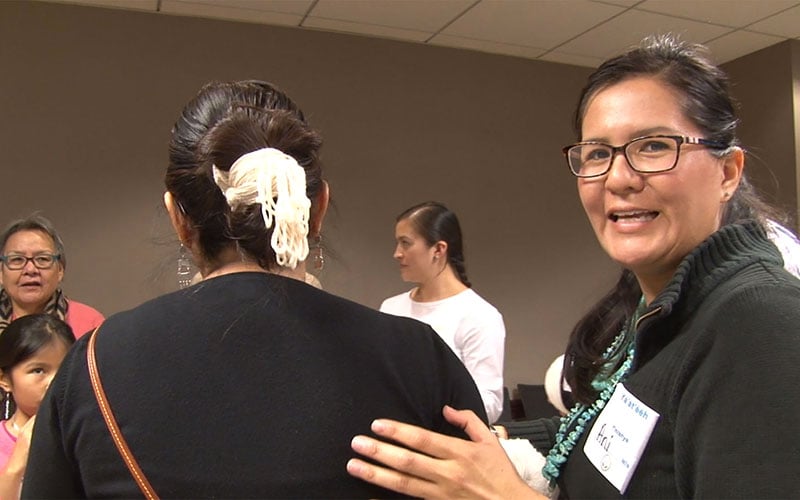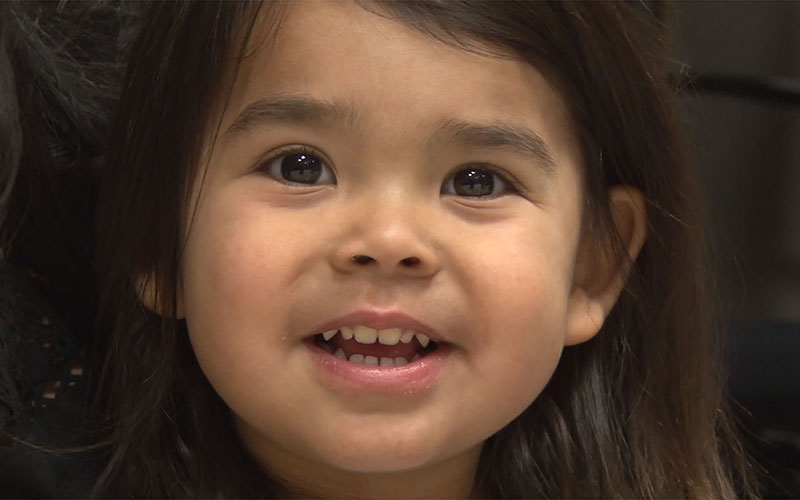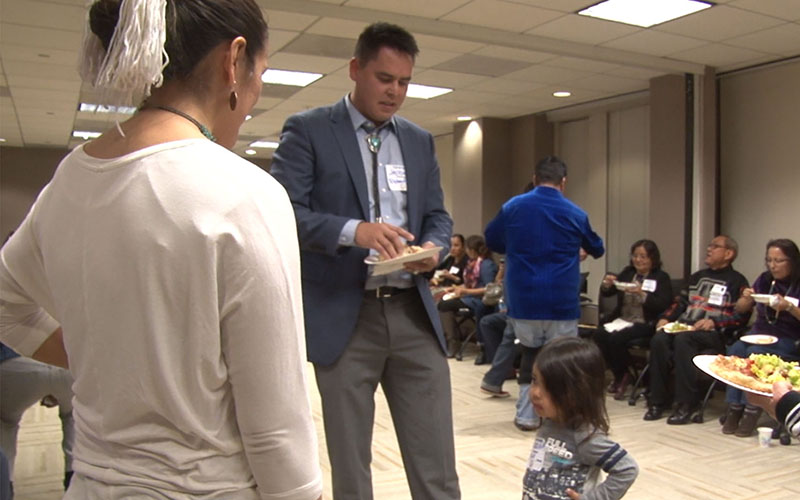
Ani Auld shows what a traditional tsiiyéél, or Navajo hair bun, looks like. She said skills like that help ensure that Navajo aren’t “outsiders to our own culture,” when they head home. (Photo by Katie Bieri/Cronkite News)

Evan Brossy, 2, whose parents brought him to the Navajo Nation event where Washington-area members of the tribe celebrate their heritage with food, games and crafts. (Photo by Katie Bieri/Cronkite News)

Jackson Brossy, executive director of the Navajo Nation Washington Office, brought son, Evan, 2, to the Navajo Nation event so the boy could stay in touch with tribal culture. (Photo by Katie Bieri/Cronkite News)
WASHINGTON – In a windowless, fluorescent-lit conference room near Capitol Hill, Ani Auld’s hands slowly and rhythmically wound strands of white yarn into a tsiiyéél, a traditional Navajo hair bun.
“When your hair’s tied up, your thoughts are gathered,” Auld explained to the half-dozen eager students, crowded around her to learn the craft. “Because your strands of hair are like thoughts, so if you just let them fall out, then your mind kind of runs wild.”
Keeping thoughts tied up with the tribe was the point of this annual gathering on a recent Friday, hosted by the Navajo Nation Washington Office.
Dozens of tribe members, old and young alike, came together to play games, learn crafts and eat traditional foods so they can “have those connections back to Arizona,” in the words of one participant.
“When we go home, we don’t want to be outsiders to our own culture,” Auld said, after breaking down the instructions for winding a tsiiyeel and explaining the significance behind the act.
For Jackson Brossy, the executive director of the Navajo Nation Washington Office, having the gathering is one way to celebrate Navajo culture in the heart of the big city.
– Cronkite News video by Katie Bieri
“To have this community here doing things that we would be doing back home,” Brossy said. “It’s really great for us that are away from our home community.”
Across the room, Brossy’s 2-year-old son’s big brown eyes grew even wider as his mother slowly extended a juicy bit of frybread, loaded with cheese, beans and other toppings, toward his mouth.
“Are we happy to be here?” Katie Brossy asked her son, Evan, who sat quietly in her lap, curious at all the noise and activity swirling in the room.
“Mm-hm,” Evan nodded, his mouth full of beans.
The Brossys said they try to visit family as often as possible back on the Navajo Nation, which sprawls across parts of Arizona, New Mexico and Utah. But for the times that they cannot get back to family in Arizona, the Brossys said they understand the importance of surrounding Evan with the tribe’s culture and traditions.
“It’s really important for us to teach Evan where he comes from and have those connections back to Arizona,” said Katie Brossy, a member of the Ponca tribe.
One of those traditions, the Navajo shoe game, is usually the centerpiece of the Navajo Nation annual event in Washington. But the game is not supposed to be played after early spring, and it was determined that this year’s get-together came too late for the game.
So while the shoe game was out, there were still penny games, acorns and empty shoes lining the floor. Children scattered to play while adults led stations, balancing the role of parent and instructor.
“It’s good for them to get together and just spend time together as family,” said Navajo Nation Council Delegate Walter Phelps, who was at the Washington event. “That’s a really, really, beautiful thing.”